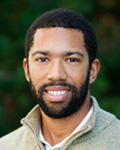Ph.D. in Sociology, 2017
School of Education
March 1, 2012
“I have long felt a desire and duty to assist others who have been less fortunate than I in their life circumstances.”
Growing up in the heart of San Francisco, I often wondered why the rich racial, ethnic, and cultural diversity of the city wasn’t always present in the schools I attended. I quickly discovered that societal opportunities were not always distributed fairly, and that many people and communities were disadvantaged through no fault of their own. Therefore, community activism and service were values that I internalized early on, and I have long felt a desire and duty to assist others who have been less fortunate than I in their life circumstances.
I first became interested in issues of diversity and equity in education during the mid-1990s when affirmative action policies were a hot topic in California. I would read stories about affirmative action in the San Francisco Chronicle and discuss what I’d read with my parents and older brother. The general concept of affirmative action made sense to me, and I had trouble as a 10-year-old trying to understand why there was so much controversy and opposition.
In 1996, most of my friends were concerned with Michael Jordan’s latest performance or a new hit song on the radio. I was interested in those things too, but I also was focused on the outcome of Proposition 209. I remember feeling frustrated that I was not eligible to vote in the election, and I was disappointed when the measure passed and ended affirmative action in California. I decided at that time that when I grew up I would pursue a career serving disadvantaged students and students of color in some capacity, and I am thrilled that the time has finally come for me to engage that pursuit in earnest.
I earned a B.A. in Psychology from Stanford University in 2007 and am currently pursuing a Ph.D. in Education at UC Irvine, specializing in Educational Policy and Social Context. My research interests focus on improving educational opportunities and outcomes for disadvantaged minority students, especially African American and Latino males. I am particularly interested in how assets of social and cultural capital can aid low-income and minority students and families in their academic endeavors, and how these students and families might acquire such capital.
My interest in social and cultural capital has led me to extant literature concerning the various effects of tracking and the benefits of career academies within public schools. Consequently, I am eager to contribute to the current body of findings on how schools, colleges, and universities structure opportunity for students. I also am drawn to researching contexts in which students are succeeding academically despite perceived disadvantages and a lack of resources. Why are those students succeeding and how can we work to replicate their successes in similar contexts with similar populations? Concurrently, I am interested in research that promotes student engagement with local businesses, civic and arts organizations, and after-school programs.
Ultimately, my research interests are committed to increasing the access and persistence of minority students in higher education by influencing the policies and practices that students experience at all grade levels.
